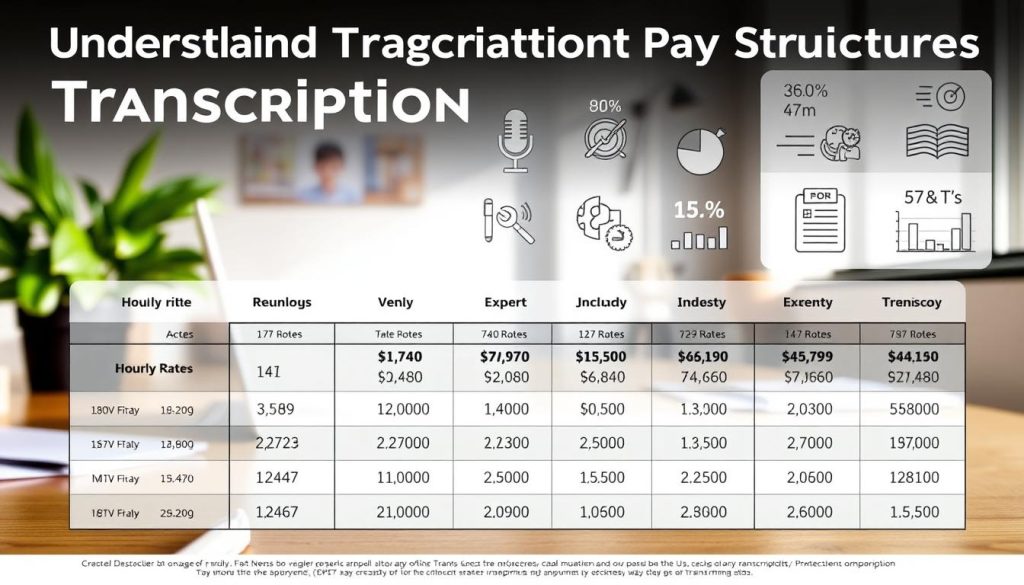Ever dreamed of working from home with flexible hours? Transcription might be your perfect fit. This career lets you turn audio into text, and demand is growing fast.
Industries like media, legal, and academic need skilled transcribers. You don’t need prior experience to begin. Many start with basic typing skills and practice.
You can work part-time or full-time. Your earnings grow with your speed and accuracy. Companies like Rev and GoTranscript offer real opportunities.
This guide will walk you through the needed skills, tools, and jobs. We’ll share tips to help you succeed and enjoy the freedom this work offers.
Table of Contents
Key Takeaways
- Transcription offers flexible, remote work from home with no experience required.
- Demand is high across media, legal, and academic fields.
- Earnings depend on your typing speed and attention to detail.
- Popular platforms like Rev provide accessible entry points for beginners.
- Success comes with practice and dedication to improving your skills.
- This career supports both part-time side income and full-time professional growth.
- It’s a great option for those seeking independent, satisfying work.
What is a Freelance Transcriptionist and Why Consider It?
Imagine earning income while listening to fascinating conversations from around the world. A transcription professional converts spoken audio into accurate written documents. This work happens remotely, giving you freedom to choose your location and schedule.
The flexibility benefits are significant. You can work from home in France or anywhere with internet access. This eliminates commute stress and traditional office constraints. Many appreciate setting their own hours around family needs.
Content variety makes this work engaging. You might transcribe legal proceedings, celebrity interviews, or research focus groups. Each project brings new stories and learning opportunities.
The emotional reward comes from being part of important moments. As one worker shared:
« Hearing someone’s story and preserving it in text feels meaningful. You become part of their journey. »
Income potential grows with experience. Beginners might start with modest earnings, but dedicated workers can increase their rates significantly. The table below shows typical starting ranges:
| Experience Level | Average Hourly Rate | Typical Projects |
|---|---|---|
| Beginner | $10-15 | Short audio clips, practice files |
| Intermediate | $15-25 | Interviews, podcasts, basic legal |
| Advanced | $25-40+ | Complex legal, medical, technical |
Entry barriers are low. Companies welcome beginners with good language skills. No special degrees or certificates are required to start. Basic typing ability and attention to detail matter most.
This work suits various lifestyles. Students, parents, and career-changers find it fits their schedules. One person transitioned from truck driving to transcription for better work-life balance.
If you enjoy language and multimedia content, this could be your path. Strong listening skills and interest in different topics help you succeed. Transcription offers a gateway to remote work independence.
The digital world continues creating new opportunities. Audio content needs conversion into written form across many industries. This demand makes transcription a stable choice for remote work.
Essential Skills for Transcription Success
The path to excellence in converting spoken words to written documents requires developing key competencies. These fundamental abilities separate average performers from top professionals in the field.
Strong Listening and Typing Abilities
Active listening forms the foundation of quality work. You must catch every word, even with accents or background noise.
Patience becomes crucial when audio quality suffers. Fast speakers or unclear recordings test your focus and determination.
Typing speed directly impacts your earning potential. Many companies require 70+ words per minute with 98% accuracy.
SyncScript specifically demands this standard. Other platforms accept beginners at 50 WPM while they improve.

Regular practice builds both speed and accuracy. Online typing tests and sample audio files help tremendously.
Grammar and Language Proficiency
Perfect grammar ensures professional credibility. Error-free transcripts keep clients coming back for more work.
Punctuation mastery makes documents readable. Proper commas, periods, and paragraph breaks create clear text.
Language skills open additional opportunities. French speakers can find specialized work with local companies.
Paris-based firms often need bilingual professionals. This creates excellent prospects for residents throughout France.
These core abilities directly affect your income. Higher accuracy means better pay and consistent project offers.
Beginner transcriptionists should honestly assess their current level. Everyone can improve with dedicated practice over time.
The journey starts with recognizing where you need growth. Then focused effort transforms basic skills into professional expertise.
Gathering Your Transcription Toolkit
Your success in audio-to-text work depends on having the right equipment. Quality tools make the difference between struggling and thriving in this field.
Think of your setup as an investment in your future earnings. The right gear helps you work faster and more accurately.
Computer and Internet Requirements
A reliable computer forms the foundation of your work. Both Windows and Mac systems work well for most projects.
Your internet connection must be stable and fast. This ensures quick file uploads and downloads without interruptions.
Some companies have specific software needs. Microsoft Office is commonly required for document formatting.
Headphones and Optional Foot Pedal
Quality headphones are non-negotiable for clear audio. Over-ear models provide excellent noise isolation.
Many professionals recommend investing in comfortable, high-quality headphones. They make long sessions much easier.
The foot pedal might seem unusual at first. This optional tool lets you control playback with your feet.
Hands-free operation boosts your efficiency significantly. Many workers find their speed increases by 20-30%.
Text expander software also helps with common phrases. These small investments pay for themselves quickly.
Creating a quiet workspace is equally important. Good concentration leads to accurate transcripts every time.
Many beginners worry about equipment costs. The good news is that most tools are affordable one-time purchases.
| Equipment Type | Purpose | Estimated Cost (€) | Where to Find in France |
|---|---|---|---|
| Computer | File processing and software | 400-800 | FNAC, Darty, local electronics stores |
| Headphones | Clear audio playback | 50-150 | Boulanger, Amazon.fr, specialized audio shops |
| Foot Pedal | Hands-free playback control | 80-120 | Online specialty stores, Amazon.fr |
| Internet Service | File transfers and communication | 30-50/month | Orange, SFR, Free, Bouygues Telecom |
Companies like GMR Transcription have specific equipment requirements. Checking company guidelines helps you prepare properly.
Your toolkit directly affects your per-minute earnings. Better equipment means faster turnaround and higher income.
This foundation sets you up for professional success. The right tools make your work enjoyable and profitable.
Understanding Transcription Pay Structures
Knowing how you’ll earn money in this field helps set realistic expectations. Different companies use various payment methods that affect your income.
Per-Minute vs. Per-Word Rates
Most beginners start with per-minute pay structures. Companies like Rev offer 30¢ to $1.10 per audio minute.
Clear audio files typically pay more than difficult recordings. This system rewards quality work with better rates.

Some companies prefer per-word payment methods. Ubiqus and similar platforms average around $1 per audio minute.
Each system has advantages for different skill levels. Beginners often find per-minute rates more predictable.
Factors Affecting Your Earnings
Several elements influence how much money you can make. Audio quality stands as the most important factor.
Multiple speakers or background noise reduce pay rates. Complex subject matter also affects compensation.
Language specialization creates higher earning potential. French speakers in France often command premium rates.
The industry standard 4:1 time ratio means four minutes of work for one minute of audio.
Accuracy and speed directly impact your income. Many companies offer bonuses for excellent work.
Fast turnarounds can increase your per-minute pay significantly.
TranscribeMe starts beginners at 25¢ per minute for short clips. Daily Transcription offers 75-85¢ per minute for clearer files.
Tracking your time helps calculate effective hourly rates. Fast typists can achieve $15-$20 per hour.
Regional variations matter for local opportunities. French language projects often provide competitive rates.
Your pay increases with skill specialization and consistent quality work.
Top Companies for Beginner Transcriptionists
Your first transcription job might be closer than you think with these companies. Many platforms welcome newcomers and provide excellent starting points.
These organizations offer genuine opportunities to build your skills. You can find work that matches your current ability level.
Rev: Flexible Entry-Level Opportunities
Rev stands out as a top choice for beginners. They constantly hire new workers and offer flexible hours.
Their pay ranges from 30¢ to $1.10 per audio minute. The platform provides a user-friendly system that many find helpful.
« Rev’s system made my transition into transcription smooth and straightforward. »
They welcome applicants with good grammar skills. The application includes a transcription accuracy test.
GoTranscript: Worldwide Language Support
GoTranscript operates globally and supports multiple languages. They specifically welcome French speakers from France.
No prior experience is necessary to apply. They offer weekly payouts through various payment methods.
The company provides tests for grammar and transcription skills. Their team offers support throughout the process.
TranscribeMe: Short Audio Clips for Practice
TranscribeMe focuses on short audio clips of 2-4 minutes. These brief files are perfect for practicing your skills.
They pay 25¢ per audio minute for these projects. While the pay is lower, the practice value is high.
This approach helps beginners build confidence gradually. You can work on multiple short files each day.
Other quality companies also welcome newcomers. SyncScript requires 70+ WPM but pays 57-63¢ per minute.
Focus Forward offers 40¢ per minute with biweekly PayPal payments. Both companies maintain high quality standards.
Most companies include grammar and accuracy tests. These ensure you meet their basic requirements.
Working for multiple companies simultaneously boosts your income. It also increases available job opportunities.
Many successful workers maintain profiles with several platforms. This strategy provides consistent work availability.
Starting with these companies helps build your portfolio. After gaining experience, you can pursue higher-paying opportunities.
Apply to several companies to maximize your chances. The more applications you submit, the better your opportunities.
| Company | Requirements | Pay Rate | Special Features |
|---|---|---|---|
| Rev | Grammar test, accuracy | 30¢-$1.10/min | Flexible hours, constant hiring |
| GoTranscript | No experience needed | Varies by file | French support, weekly pay |
| TranscribeMe | Basic skills | 25¢/min | Short clips, good practice |
| SyncScript | 70+ WPM | 57-63¢/min | Higher pay for skilled workers |
| Focus Forward | Accuracy test | 40¢/min | Biweekly PayPal payments |
Applying for Transcription Positions
The application journey for transcription roles combines practical testing with skill demonstration. Companies want to see your abilities in action before offering work.
This process typically involves several steps. Each stage helps employers assess your suitability for their specific needs.
Understanding what to expect reduces anxiety. Proper preparation increases your chances of success significantly.
Preparing for Transcription Tests
Practice makes perfect when getting ready for assessment. Free resources like Scribie offer sample audio clips.
Use these materials to improve your accuracy. Focus on catching every word and punctuation mark.
Quality headphones make a big difference during practice. They help you hear subtle details in the audio.

Time your work to build speed gradually. Many companies expect a 4:1 ratio (four minutes work per audio minute).
Review style guides before testing. Different companies have unique formatting requirements.
One successful applicant shared:
« Practicing with various audio types prepared me for real tests. The investment paid off with multiple job offers. »
Navigating the Application Process
Most applications begin with an online form. You’ll provide basic information and language skills.
Grammar tests usually come next. These assess your understanding of punctuation and sentence structure.
Transcription tests follow with audio samples. Beginners typically get clear audio with one speaker.
Experienced roles may feature challenging clips. Multiple speakers or background noise test your skills.
Editors review your work for accuracy and style. They check formatting like timestamps and speaker labels.
Some companies have specific processes. GoTranscript offers language-specific tests for French speakers.
Rev includes a grammar quiz in their application. Research each company’s requirements beforehand.
Approval can take several days or weeks. Apply to multiple companies to increase opportunities.
Rejection is common for first-time applicants. Use feedback to improve and reapply later.
Helpful tips for application success:
- Review your work carefully before submission
- Follow style guides exactly as specified
- Use reliable internet during testing
- Choose quiet hours for undisturbed focus
- Learn from any feedback provided
These tests serve as valuable learning experiences. They help you gauge readiness for actual transcription work.
No prior experience is needed for most positions. Strong typing and grammar skills matter most.
The application process opens doors to flexible work. Successful candidates enjoy meaningful remote opportunities.
Working with Multiple Languages
Your ability to understand different languages opens exciting doors in this field. Many companies actively seek professionals who can work with audio in various tongues.
This skill set creates unique opportunities for people around the world. You can connect with content from different cultures and communities.
Language skills give you a competitive edge in the marketplace. Companies often pay premium rates for specialized linguistic abilities.
Opportunities for French Speakers
French speakers enjoy excellent prospects in this industry. Companies like GoTranscript specifically hire for French language projects.
Demand comes from both local and international clients. French companies need accurate transcripts for business meetings and legal proceedings.
Global media companies seek French content conversion too. This creates a steady stream of work for qualified professionals.
The application process for language roles involves special testing. You’ll complete grammar and accuracy assessments in French.
One successful applicant shared their experience:
« My French fluency became my greatest asset. I quickly found consistent work with international clients. »
This specialization often means less competition and higher pay rates. You can build a rewarding career using your native language skills.
Dialect Specialization Advantages
Understanding specific dialects adds another layer of opportunity. Companies value workers who recognize regional variations.
European French differs from Canadian French in many ways. Recognizing these nuances ensures accurate transcription work.
Other language pairs offer similar advantages. Brazilian Portuguese varies from European Portuguese in pronunciation and vocabulary.
Farsi and Dari have distinct characteristics despite shared roots. Mandarin and Cantonese represent different Chinese language branches.
Listing your dialect expertise makes your application stand out. GoTranscript encourages workers to specify their regional language knowledge.
Cultural understanding becomes crucial for accurate work. You need near-native proficiency to catch subtle references and expressions.
This specialization leads to premium pay rates and interesting projects. You become the go-to person for specific language needs.
| Language Pair | Key Differences | Market Demand | Potential Rate Increase |
|---|---|---|---|
| European vs Canadian French | Vocabulary, pronunciation, idioms | High in international business | 15-20% higher than standard rates |
| Brazilian vs European Portuguese | Grammar structures, accent marks | Growing in media localization | 20-25% premium for accuracy |
| Farsi vs Dari | Pronunciation, modern vocabulary | Specialized government work | 30-40% above base rates |
| Mandarin vs Cantonese | Tones, character usage, grammar | High in legal and business sectors | 25-35% additional compensation |
Right-to-left languages like Arabic offer additional opportunities. These specialized skills command even higher market rates.
The best way to maximize your earning potential involves highlighting your unique language abilities. This approach sets you apart from general transcription workers.
Your multilingual skills represent a valuable career asset. They open doors to better pay and more interesting projects worldwide.
Managing Your Transcription Workflow
Your daily rhythm in this profession revolves around smart file selection and timely delivery. Developing an efficient process makes your work enjoyable and profitable.
Successful workers create systems that maximize their earning potential. They balance speed with consistent accuracy throughout their work hours.
Choosing Files and Meeting Deadlines
Company dashboards display available audio files with different characteristics. GoTranscript and similar platforms show length, difficulty, and subject matter.
Select projects that match your interests and current skill level. Shorter files help build confidence before tackling complex assignments.
Deadlines depend on audio length and company policies. Most platforms calculate turnaround time based on a standard 4:1 work ratio.
Meeting deadlines maintains your good reputation with the team. Late submissions can lead to penalties or reduced job access.

Quality Control and Feedback
Editors review every transcript for accuracy and formatting. They check against style guides and provide constructive feedback.
This quality control process ensures consistent standards across all work. Your accuracy scores directly affect future job opportunities.
One experienced worker shared their perspective:
« Feedback, even when critical, became my best teacher. Each review helped me improve my speed and accuracy. »
High quality scores unlock better-paying projects over time. Companies reward consistent performers with premium files.
Practical workflow tips for success:
- Use text expanders for common phrases and formatting
- Organize files clearly to avoid confusion between projects
- Take regular breaks to maintain focus during long sessions
- Always proofread your work before submission
- Learn from editor comments to continuously improve
Common pitfalls to avoid:
- Underestimating the time required for difficult audio
- Neglecting to proofread before submitting work
- Accepting files beyond your current skill level
- Ignoring style guide requirements
Feedback varies between companies – some provide detailed notes while others offer minimal comments. Rev’s feedback can be inconsistent, so focus on what you receive.
This workflow management approach creates sustainable career growth. Smart file selection and quality focus lead to better opportunities.
The right process helps you serve more people effectively while growing your skills. Your system becomes your path to professional advancement.
Building Your Transcription Career
Your journey in this field offers exciting growth potential over time. With dedication and smart strategies, you can transform basic skills into a rewarding profession.
Practice becomes your most valuable tool for improvement. Regular work on audio files naturally increases both speed and accuracy.
These improvements directly boost your hourly earnings. Many workers see their income grow significantly within their first year.
Increasing Speed and Accuracy Over Time
Typing speed develops through consistent practice. Aim for gradual progress rather than immediate perfection.
Online typing tests help track your words per minute. Many successful professionals reach 100 WPM with dedicated effort.
Accuracy matters just as much as raw speed. Companies value workers who maintain 98% or higher accuracy rates.
One worker shared their experience:
« My first month I earned $200 part-time. After six months of practice, I reached $2,000 monthly with the same hours. »
Feedback from editors provides crucial learning opportunities. Each comment helps you identify areas for improvement.
Consider specialized courses like Transcribe Anywhere. These programs offer structured learning paths for skill development.
Transitioning to Higher-Paying Work
Specialization opens doors to better compensation. Legal and medical transcription often pay premium rates.
Companies like Allegis offer specialized opportunities. These roles require additional training but provide excellent earnings.
Glassdoor reports experienced workers earning $15-$20 per hour. Some top performers achieve even higher rates.
Language specialization creates additional advantages. French speakers can find premium opportunities throughout France.
Diversifying your client base stabilizes income. Working with multiple companies ensures consistent project availability.
Full-time work becomes possible with experience. Some professionals at GoTranscript handle full-volume capacity.
Strategic goal setting accelerates your progress. Target specific speed and accuracy benchmarks to qualify for better jobs.
This career path offers tangible growth potential. You can build a sustainable profession from home with flexible hours.
According to general freelance data, specializing in high-demand areas increases earnings significantly.
The transcription industry rewards continuous improvement. Your dedication today creates better opportunities tomorrow.
Finding Your Own Clients
Ready to take control of your career and earnings? Working directly with clients offers the best path to maximize your income potential. This approach lets you build lasting relationships and set your own terms.
Many successful professionals start with company work first. This builds experience before venturing out independently. The transition happens naturally as skills and confidence grow.
Marketing Strategies for Independent Work
Finding clients requires smart outreach and visibility. Social media platforms offer excellent networking opportunities.
LinkedIn helps connect with professionals needing transcription services. Join relevant groups and share your expertise regularly.
Facebook groups attract specific client types like podcasters and researchers. Craigslist can yield local opportunities with lawyers and journalists.
Creating a professional website showcases your services effectively. Platforms like Q Transcription demonstrate how to present your work professionally.
One independent worker shared their success story:
« Direct clients changed everything. I went from earning company rates to keeping full payment for my work. »
Specializing in niches like legal transcription commands premium rates. This focus makes marketing easier and more effective.
Setting Your Rates and Managing Business
Independent work means setting your own pricing structure. Charging per audio minute works well for most projects.
A rate of $1 per minute translates to $30-$45 per hour. This compares favorably to company splits where platforms keep half the client fees.
Business management becomes part of your job responsibilities. Invoicing, contracts, and client communication require organization.
Courses like Transcribe Anywhere cover these essential skills. They provide templates and guidance for professional operations.
Common client types include:
- Lawyers needing deposition transcripts
- Journalists conducting interviews
- Researchers documenting studies
- Podcasters expanding their audience
This approach offers higher earning potential but requires more effort. Marketing and administration become your responsibility alongside transcription work.
Independent work represents the ultimate goal for many professionals. It maximizes income while providing complete career control.
Balancing Transcription with Life
Finding harmony between professional responsibilities and personal priorities becomes achievable with remote audio work. This career path offers remarkable flexibility that adapts to your unique lifestyle needs.
Creating a Flexible Schedule
You control when and where you complete your projects. Many platforms like GoTranscript impose no minimum hour requirements.
This freedom lets you attend family events without stress. Parents can work during school hours or nap times. Students can schedule around classes and exams.
Effective time management makes your schedule work for you. Designate specific hours for focused transcription sessions. Use time-blocking to maximize productivity.
One successful worker shared their experience:
« Transcription let me be present for my children’s milestones while maintaining a fulfilling career. The flexibility changed our family dynamic for the better. »
Daily goals keep you motivated and on track. Even part-time hours can generate meaningful income over time.
Working From Home in France
French residents enjoy particular advantages in this field. Local opportunities combine with global accessibility.
Working from home eliminates stressful commutes through Paris traffic. You save both time and transportation costs. This creates better work-life balance immediately.
Many people find they’re more productive in their own space. A dedicated workspace helps maintain professional focus.
French language skills open doors to local clients. Regional companies often prefer working with nearby professionals.
The digital nature of this work means location doesn’t limit opportunity. You can work from countryside villages or city apartments equally well.
Challenges exist but are manageable. Self-discipline becomes your most valuable skill. Creating routines helps overcome potential isolation.
Distractions at home require conscious management. Many successful workers use noise-canceling headphones during focused sessions.
This career path supports various life stages beautifully. Parents, students, and career-changers all find it adaptable to their needs.
One former truck driver switched to transcription for more family time. Their story illustrates how this work can transform lifestyles.
View transcription as your tool for designing the life you want. The flexibility empowers you to prioritize what matters most.
This approach to remote work offers genuine satisfaction throughout France and beyond. You control both your professional path and personal time.
Conclusion
Your journey into transcription starts with simple steps. Develop your typing and grammar skills first. Gather basic tools like headphones and a quiet workspace.
Apply to companies like Rev or GoTranscript for entry-level jobs. These platforms offer real opportunities to begin earning income from home.
With practice, your speed and accuracy will grow. Many see their income rise from beginner rates to $30-$45 per hour.
French speakers enjoy special advantages in this field. Global demand for language specialists creates excellent opportunities.
Start today with free online resources. Test your interest before committing fully.
Join the community of skilled professionals. Turn your abilities into a rewarding career with flexible hours.
Anyone can succeed in this field with dedication. Begin your path to work-from-home success now.
FAQ
What does a transcriptionist do?
A transcriptionist listens to audio or video files and types out what is heard. This work turns spoken words into written text for various uses like interviews, meetings, or content creation.
What skills do I need to start in transcription?
You’ll need strong listening and fast typing skills, plus a good grasp of grammar and language. Accuracy and attention to detail are key to producing quality transcripts.
What equipment is necessary for transcription work?
You’ll need a reliable computer, high-speed internet, and comfortable headphones. Many professionals also use a foot pedal to control audio playback hands-free.
How is pay calculated in transcription jobs?
Pay is often based on audio minutes transcribed or per word typed. Your earnings can vary based on factors like audio quality, subject matter, and your speed.
Which companies are good for beginners?
A> Companies like Rev, GoTranscript, and TranscribeMe offer entry-level opportunities. They provide flexible work and support for multiple languages, making them great places to start.
How can I increase my income over time?
With practice, you can improve your speed and accuracy. Many transcribers move on to higher-paying specialized work or find their own clients to boost earnings.
Can I work as a transcriptionist from home?
Absolutely! Most transcription work is remote, allowing you to create a flexible schedule. This makes it an ideal job for those seeking work-from-home opportunities.





